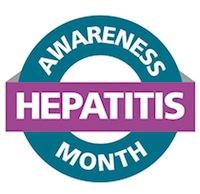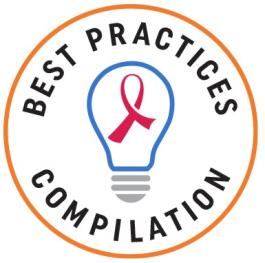
A, B, and C. These are the three most common hepatitis viruses. The first two are preventable by vaccines. The third is curable.
Learn the ABCs of Viral Hepatitis (CDC, April 2024) and see what plans are in place to address hepatitis in the Viral Hepatitis National Strategic Plan for the United States: A Roadmap to Elimination 2021-2025 (January 2021), which states in its Executive Summary: "the nation faces unprecedented hepatitis A outbreaks, progress on preventing hepatitis B has stalled, and hepatitis C [HCV] rates nearly tripled from 2011 to 2018."
How are we doing? The Viral Hepatitis National Strategic Plan set a goal for over 80% of people with HCV to achieve viral clearance by 2030. The HCV clearance cascade (steps from testing positive for HCV to treatment and a cure) found "that the prevalence of viral clearance among persons with diagnosed hepatitis C was only 34% overall...." (CDC/MMWR, 6/30/2023).
May is Hepatitis Awareness Month and May 19 is Hepatitis Testing Day.
Hepatitis C co-infection among persons with HIV is of particular concern as the disease progresses more rapidly and is more prevalent. From 15 to 30% of people with HIV are also infected with Hepatitis C, as cited in the Hepatitis C Coinfection chapter of the National HIV Curriculum. Coinfection rates are much higher among injection drug users who have HIV, according to CDC.
Search for our tools on managing hepatitis and see our Hepatitis topic page.
Hepatitis C Treatment
Treatments to cure hepatitis C have been available for a number of years. HRSA's HIV/AIDS Bureau has developed provider resources on hepatitis screening and treatment for use by Ryan White HIV/AIDS Program (RWHAP) agencies. These and other tools are summarized on the AETC National Coordinating Resource Center's (NCRC) viral hepatitis confection topic page. Highlights include the HIV/HCV Coinfection: An AETC National Curriculum (includes includes HIV/HCV Co-infection Resources for providers as well as patients and patient educators, like tools to engage patients in HCV care) and the National HIV Curriculum's Hepatitis C Coinfection section.
HHS guidelines (updated March 2023) recommend that all people with HIV be tested for HCV, with those testing positive be evaluated for HCV treatment. CDC Recommendations for Hepatitis C Screening Among Adults — United States, 2020 recommend expanded screening for all individuals over 18 years of age and testing for various groups, including people with HIV.
Best Practices in HCV/HIV Care Delivery

HRSA's Best Practices Compilation (interventions with demonstrated effectiveness at improving health outcomes) includes projects that integrated HCV screening and treatment within HIV services.
- Several Best Practices connect HIV/HCV co-infected patients into care by using public health surveillance and clinical data. Both projects identified more HCV-positive patients and subsequently achieved improved treatment and cure rates. See Treating Hepatitis C Virus: A Data to Care Approach and Data to Care for People Coinfected with HIV and Hepatitis C Virus. Both efforts were developed under the project Leveraging a Data to Care Approach to Cure Hepatitis C within the RWHAP (SPNS 2020-2022). Resources includes a manual, tools to develop jurisdiction-specific treatment cascades, and more.
- Two additional Best Practices integrated HCV case within their HIV clinics. Both achieved improved HCV treatment outcomes. They include Hepatitis C Screening and Treatment Expansion and Integration of HCV Treatment within an HIV Clinic. Both were developed under a HRSA SPNS Hepatitis C Treatment Expansion Initiative from 2010-2014.
Measuring Performance and Using Data
RWHAP agencies are using HRSA Performance Measurement resources to support RWHAP programs in monitoring the delivery of HIV care, inclusive of hepatitis. HAB's Performance Measures are comprised of multiple sets, with an adolescent/adult set of measures that includes specific measures addressing hepatitis B screening and vaccination and hepatitis C screening.
In addition, HRSA's Ryan White Services Report, the RSR client-level data system, is used by RWHAP recipients and subrecipients to collect performance measure data on hepatitis B screening and vaccination as well as hepatitis C screening.